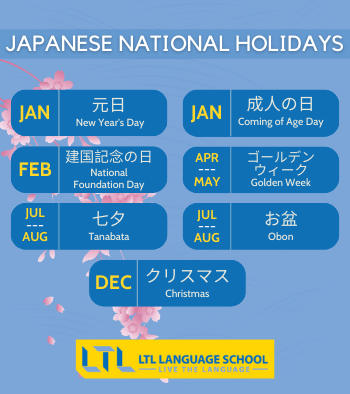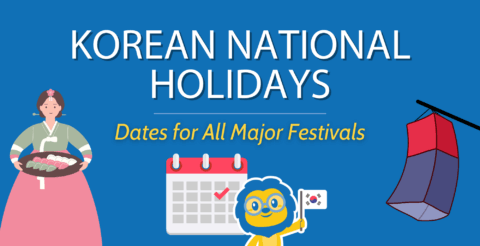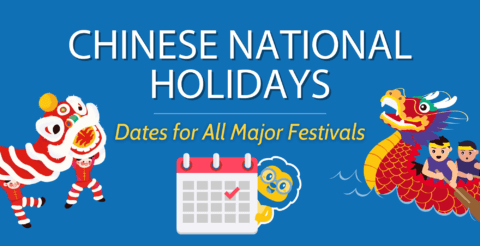2025 & 2026 Japanese National Holidays Explained: Dates & Significance
Below is a list of the 2025 Japanese National Holidays.
Further down, we will also talk about how the Japanese Public Holidays’ significance and how they are celebrated.
There is also a list of the 2026 Japanese National Holidays.
Throughout the page we’ve also created a number of images (including the one you can see here) that you can download, share and save.

Let’s learn about the Japanese National Holidays in more detail now!
First up, the dates for 2025.
Japanese Holidays | Japanese Holidays in 2025
Japanese Holidays | Japanese Holidays in 2026
Japanese Holidays | How Does Japan Celebrate Holidays?
Japanese Holidays | FAQs
HOW DOES JAPAN CELEBRATE HOLIDAYS?
Here’s a quick rundown on how Japanese people celebrate the big days in the calendar. We will also take a look at how Christmas is celebrated in Japan.
New Year’s Day
New Year’s Day is officially known as 元日 (がんじつ ganjitsu).

The celebrations on New Year’s Day are commonly referred to as 正月(しょうがつ shogatsu).
On this day, people typically dress up and go with families or friends to visit shrines to make wishes for the upcoming year.
These wishes include good health, passing exams, and luck in love.
At the shrines, people will also draw fortunes which are said to determine their luck for the upcoming year, ranging from very bad to very good.
If you draw a bad or very bad luck fortune, you can tie it to a tree branch, which is said to ward away the bad luck.
Coming of Age Day
Coming of Age Day, celebrated at the start of January, is the day where children officially become adults in Japan.
Anyone who has turned 20 years old in the past year participates in a celebration. They dress up, either wearing a kimono (women) or a suit (men) and take lots of pictures to commemorate their entry into adult society.
While you can vote at the age of 18 in Japan, you cannot get your driver’s license or do many other things until the age of 20, so it’s a very significant and important day.
Setsubun
Setsubun celebrates the arrival of Spring.

On this day, people throw fukumame, or roasted soybeans, out of the front door, and shout “Oni wa soto! Fuku wa uchi!” (Devils out! Fortunes in!) before slamming the door.
This practice symbolically purifies the home and banishes bad luck and illness for the next year.
After throwing the fukumame, the participants then eat one fukumame for each year of their life, plus one more for good luck.
National Foundation Day
As the name suggests, National Foundation Day, which takes place on February 11th, celebrates the Foundation of Japan.
On this day, citizens typically have the day off. A parade also takes place, and other festivals may also be held.
Valentine’s Day and White Day

These two days are linked together! Valentine’s Day, as in the rest of the world, takes place on February 14th.
In Japan, February the 14th is a day when women give two kinds of chocolate away. Obligation chocolate, which is typically small and store-bought, and homemade chocolate.
Homemade chocolate is given to significant others and crushes, whereas obligation chocolate is given to friends, coworkers, classmates, etc.
Notice we only mentioned women and not men.
That’s because…
White Day, which takes place a month later, is the reciprocal day where men who have received chocolate from a woman give her a gift in return that comes out to an equal value.
Golden Week
Golden Week (ゴールデンウィーク) is not one day, but a collection of holidays that fall one after another. You’ll have noticed in the table above three holidays all come directly after each other.
- Constitution Memorial Day
- Greenery Day
- Children’s Day
Along with Shōwa Day, these days all make up the Golden Week in Japan.
In Japan, most people travel during Golden Week, often to see friends and family or go on vacation abroad, as the majority of people have paid time off that week.
Tanabata

Tanabata is celebrated in July and August, and is known in English as the Star Festival.
While the date of the festival takes place varies by region, it celebrates the meeting of Orihime and Hikoboshi.
Orihime and Hikoboshi are a pair of lovers who are separated by the Milky Way and can only meet once a year, on the seventh day of the seventh month of the lunar calendar (hence the name 七夕 (Tanabata) which has the Chinese character for seven in it.
On this day, people write wishes on small pieces of paper and hang them on bamboo, which is often burned or set afloat after the festival.
Obon
Obon starts on different dates depending on one’s region, but always lasts three days.
It is a festival meant to honour the spirits of one’s ancestors.
During this time, people typically wear yukata, go to carnivals, and perform a ritual called 送り火(おくりび; sending fire).
This ritual is meant to send ancestors’ spirits back to their permanent resting place. The 盆踊り(ぼんおどり, or Bon Dance) is also performed to remember and appreciate one’s ancestor’s sacrifices.
Christmas
In Japan, Christmas is very different from how it is celebrated in the West.
DID YOU KNOW | Only 1% of Japanese people are Christian.

Due to this, Christmas is essentially a commercial holiday in Japan.
It is seen as similar to Valentine’s Day, with people going on dates with their significant others.
Families will sometimes eat a cake together, and children may receive gifts.
A tree may also be put up. Schools and offices will often have parties.
Hopefully that gives you a solid idea of what holidays are celebrated in Japan and the dates you should be looking out for on your calendar.
If you want to discover why people have to work weekends to make up for public holidays in China, you’ll want to check out our guide to Chinese public holidays here.
Whilst you are at it come and check out Korea’s most important celebrations and finally Vietnam’s big six Public Holidays also.
DID YOU KNOW | We now offer Japanese courses in Tokyo. You can study in small group classes or create your own individual program. Additionally you can even stay at one of our homestay families in Tokyo to boost your skills further.
Drop us a message if you fancy getting involved.
JAPANESE NATIONAL HOLIDAYS // FAQs
How many national holidays does Japan have?
In total there are 15 public holidays in Japan throughout the year.
When is Golden Week in Japan in 2025?
Golden week starts on April 29th in Japan for 2025.
Golden week is also made up of these three holidays:
Constitution Memorial Day
Greenery Day
Children’s Day
These all occur on May 3rd, 4th and 5th respectively
Does Japan celebrate Christmas?
DID YOU KNOW | Only 1% of Japanese people are Christian.
Due to this, Christmas is essentially a commercial holiday in Japan.
It is seen as similar to Valentine’s Day, with people going on dates with their significant others.
Families will sometimes eat a cake together, and children may receive gifts.
A tree may also be put up. Schools and offices will often have parties.
What is Coming of Age Day?
Coming of Age Day, celebrated at the start of January, is the day where children officially become adults in Japan.
Anyone who has turned 20 years old in the past year participates in a celebration.
They dress up, either wearing a kimono (women) or a suit (men) and take lots of pictures to commemorate their entry into adult society.
While you can vote at the age of 18 in Japan, you cannot get your driver’s license or do many other things until the age of 20, so it’s a very significant and important day.
How many other holidays does Japan also have?
There are around 8 significant ones such as Valentine’s Day, White Day, and Obon.
Whilst Christmas is also celebrated, it is more commercial in Japan, rather than religious.
What is the most important holiday in Japan?
Typically New Year is the most celebrated and biggest festival across the year in Japan.
The celebration is generally referred to as 正月, whilst the day itself is known as 元日.
What is White Day in Japan?
In Japan, February the 14th is a day when women give two kinds of chocolate away. Obligation chocolate, which is typically small and store-bought, and homemade chocolate.
Homemade chocolate is given to significant others and crushes, whereas obligation chocolate is given to friends, coworkers, classmates, etc.
This day is of course known as Valentine’s Day.
Notice we only mentioned women and not men.
That’s because…
White Day, which takes place a month later on March 14th, is the reciprocal day where men who have received chocolate from a woman give her a gift in return that comes out to an equal value.


 Hi, my name is Mojca! I am from Slovenia and I work as a student advisor at our Shanghai school.
Hi, my name is Mojca! I am from Slovenia and I work as a student advisor at our Shanghai school.


